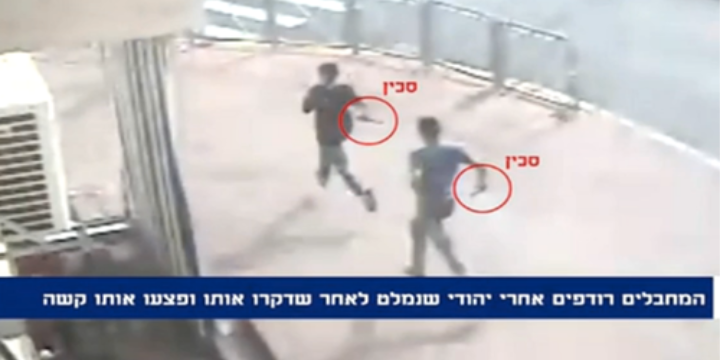According to the FBI and the Legal Information Institute (LII) at Cornell Law School, murder is when someone intentionally kills another person. Accordingly, it cannot be disputed that Noa Lazar was murdered, even though she was a soldier.
A question remains about whether Saturday’s attack was an act of terrorism.
Unsurprisingly, definitions of terrorism are ambiguous and highly politicized. However, there is a common thread among various sources: the underlying motivations and impact of the attack.
Journalists at The Atlantic distinguish between murder and terrorism, describing the latter as “public violence to advance a political, social, or religious cause or ideology.”
The National Institute of Justice (NIJ) distinguishes between murderers and terrorists as well, writing, “Whereas terrorists commit acts of violence for political gain, mass murderers lack this ideology.”
Robert J. Art and Robert Jervis — two prominent political science scholars and authors — examined what separates terrorism from all other acts of violence. They developed these definitions further, and dubbed terrorism “the deliberate creation and exploitation of fear through violence or the threat of violence in the pursuit of political change.”
Indeed, these three definitions of terrorism all have a common thread of political or ideological motivations. Jervis and Art give strong evidence that terrorism includes the psychological impact that follows from the attack.
Undoubtedly, the shooting at the Shuafat border crossing was an act of terrorism based on all three definitions.
Hamas’ praise for the attack reflects a political aim, which reinforces that the attack was an act of terrorism. The US Department of State designated Hamas as a terrorist organization in 1997.
“These operations carry a message that the revolt of our people is in progress and will not subside and that the operations, shootings, and gunfire of our youth in revolt will haunt the occupiers and herds of settlers everywhere in response to their crimes and their incursions into the Al-Aqsa Mosque,” Hamas commented.
Tamimi was motivated by promoting the political ideology of these Gaza- and West Bank-based terrorist organizations, as further attested to by the celebrations and fireworks over Shuafat later that night.
Lone wolf attacks are a key strategy for Hamas and Palestinian Islamic Jihad, because they can occur anywhere, anytime, and can be carried out by anyone.
Tarnopolsky’s analysis has been wrong before. When former Israeli prime minister Naftali Bennett’s government was sworn in, she incorrectly asserted in The Daily Beast that his Yamina party “mostly” represents “Jewish West Bank settlers.”
Notably, Tarnopolsky referred to Russian soldiers as “terrorists” just a day after the attack that killed Noa Lazar. Her definition of terrorism seems to change depending on the context.
As the situation in the West Bank escalates further, with numerous attacks against civilians and Israeli soldiers taking place each day, it is important for journalists covering the conflict to focus on reporting the facts and not use politicized words out of context.
 by Benjamin Amram
by Benjamin Amram
 Palestinian Prime Minister Announces New Reform Package
Palestinian Prime Minister Announces New Reform Package France: Man Suspected of Abducting, Raping Jewish Woman ‘to Avenge Palestine’
France: Man Suspected of Abducting, Raping Jewish Woman ‘to Avenge Palestine’ Israel Intensifies Strikes Across Gaza, Orders New Evacuations in North
Israel Intensifies Strikes Across Gaza, Orders New Evacuations in North Iran Threatens to Annihilate Israel Should It Launch a Major Attack
Iran Threatens to Annihilate Israel Should It Launch a Major Attack ‘Completely Baseless’: Reports of Mass Graves at Gaza Hospitals are False, IDF Says
‘Completely Baseless’: Reports of Mass Graves at Gaza Hospitals are False, IDF Says Columbia University Shutters Campus as Jews Fear for Safety, Critics Call for President to Resign
Columbia University Shutters Campus as Jews Fear for Safety, Critics Call for President to Resign ‘Hamas, We Love You!’ A List of the Chants, Statements From Columbia University’s ‘Gaza Solidarity Encampment’
‘Hamas, We Love You!’ A List of the Chants, Statements From Columbia University’s ‘Gaza Solidarity Encampment’ ‘Useless Pigs’: Anti-Israel Demonstrations Rage at Yale University, Forcing Police Intervention
‘Useless Pigs’: Anti-Israel Demonstrations Rage at Yale University, Forcing Police Intervention Anti-Israel Protesters Interrupt Chelsea Handler Comedy Show Because of Her Support for Jewish State
Anti-Israel Protesters Interrupt Chelsea Handler Comedy Show Because of Her Support for Jewish State Israeli Hostage Families Make Passover Plea for Return of Missing Loved Ones
Israeli Hostage Families Make Passover Plea for Return of Missing Loved Ones




 ‘Completely Baseless’: Reports of Mass Graves at Gaza Hospitals are False, IDF Says
‘Completely Baseless’: Reports of Mass Graves at Gaza Hospitals are False, IDF Says Iran Threatens to Annihilate Israel Should It Launch a Major Attack
Iran Threatens to Annihilate Israel Should It Launch a Major Attack Israel Intensifies Strikes Across Gaza, Orders New Evacuations in North
Israel Intensifies Strikes Across Gaza, Orders New Evacuations in North France: Man Suspected of Abducting, Raping Jewish Woman ‘to Avenge Palestine’
France: Man Suspected of Abducting, Raping Jewish Woman ‘to Avenge Palestine’ Palestinian Prime Minister Announces New Reform Package
Palestinian Prime Minister Announces New Reform Package